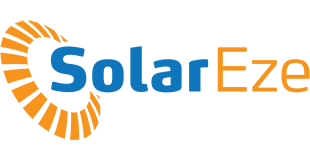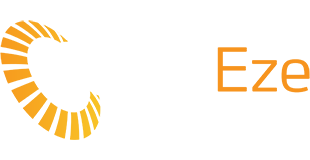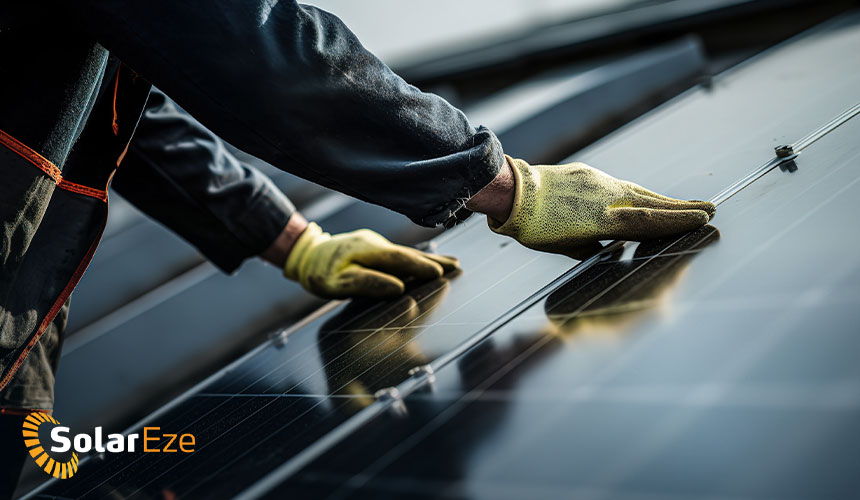Can I Install My Own Solar Panels?
DIY or no-go? Discover if you can install solar panels in Australia yourself. We explain the regulations, risks, and rewards!
15+ Years Experience
Financing Available
10 Years Warranty
CEC Qualified Installers
Wondering if you can install your own solar panels here in Australia?
Don’t be fooled by the DIY trend; this isn’t your typical home improvement project. You’re dealing with high-voltage equipment, complex technical requirements, and stringent regulations. What’s more, to secure those sweet solar rebates, you’ll need a certified professional.
So, let’s dive into the world of solar installation, where cutting corners isn’t an option and expert guidance is non-negotiable.
Key Takeaways for DIY Solar Installation
- Strict government guidance prohibits the self-installation of solar panels in Australia.
- Accreditation by the Clean Energy Council (CEC) is necessary for the installation and connection of solar panels.
- Working with solar systems involves high-voltage DC electricity, which can be dangerous if handled incorrectly.
- DIY installation of solar panels can void warranties, home insurance, rebates, and feed-in tariffs.
Understanding DIY Installation Risks
Despite the appeal of cutting costs, you shouldn’t install your own solar panels due to the strict regulations and high risks involved.
The intricacies of DIY solar panel installation stretch far beyond basic handiwork; it’s a domain swathed in technical complexities and stringent safety protocols. Understanding the electrical systems and ensuring safety is paramount, as mishandling can lead to severe injuries or even fatalities.
You must navigate a labyrinth of building codes and electrical regulations that require in-depth knowledge to ensure compliance. An accredited solar installer, certified by the Clean Energy Council (CEC), is not just a recommendation—it’s a necessity for legitimate connections to the power grid and eligibility for government rebates. These professionals bring a wealth of expertise, from assessing structural integrity to executing precise electrical connections.
Moreover, without the endorsement of an accredited installer, your handiwork could nullify warranties, impede insurance claims, and disqualify you from feed-in tariffs.
In essence, the risks and potential long-term costs far outweigh the immediate savings. Prioritise safety and efficacy; leave the installation to the experts who are trained to mitigate hazards and deliver reliable, compliant installations.
The Importance of Accreditation
As you consider installing solar panels, it’s crucial to understand that accreditation isn’t just a formality—it’s your assurance of safe, compliant, and effective solar installation.
Engaging with an accredited solar installer is a regulatory requirement in Australia and for good reason. When solar panels are installed by a CEC-accredited and licensed electrician, you’re not only complying with national standards but also optimising the performance of your investment.
CEC accreditation signifies that your electrician has completed rigorous training and adheres to the industry’s best practices. This is essential, considering the technical complexity and inherent dangers associated with high-voltage DC electricity involved in solar installations. An accredited installer ensures that the solar panels are connected correctly, minimising the risk of power surges that can damage your inverter and other electrical equipment.
Furthermore, accreditation has a direct impact on your eligibility for government rebates and the ability to sell excess electricity back to the grid. Without a CEC-accredited electrician, you cannot connect to the grid, rendering your system less financially viable.
Cutting corners by skipping proper accreditation not only jeopardises your safety and system efficiency but also affects the financial benefits of going solar.
Recognising Safety Hazards
You’ll need to be mindful of the significant safety hazards that come with installing solar panels, particularly the dangers of high-voltage DC electricity.
The risk of electrocution isn’t to be underestimated, and it’s crucial to follow stringent electrical safety protocols. As an enthusiast considering a DIY project, you must recognise that handling solar panel installation requires technical expertise that goes beyond basic electrical knowledge.
In Australia, compliance with Australian standards is non-negotiable. These standards ensure that the installation is safe and efficient, mitigating the risk of fire hazards, electrical shorts, and other system failures that can arise from improper installation. It’s not just about connecting panels; it’s about understanding the entire electrical ecosystem of your home and how solar integration impacts it.
Only an accredited installer has the specialised training to navigate these complexities safely. Accredited electricians are versed in the latest safety equipment and techniques, including safe work practices for heights. Their expertise ensures that the solar panels are not only installed correctly but also that all safety hazards are identified and mitigated before they become a problem.
Navigating Technical Complexity
When considering the installation of solar panels on your home, you must navigate the technical complexities that come with the process.
DIY solar panel installation may seem tempting due to potential cost savings, but it’s fraught with challenges that require a deep understanding of electrical systems and safety requirements.
Before installing solar panels yourself, here’s what you need to consider:
- Electrical Wiring: You’ll need to be proficient in handling electrical wiring, adhering to Australian Standards AS/NZS 3000.
- System Design: Proper system design is crucial to ensure that your solar panels operate efficiently and safely.
- Safety Requirements: You must be well-versed in safety requirements, including working at heights and electrical safety procedures.
- Council Regulations: Local council regulations may dictate specific installation standards and require building permits.
- Accreditation: Installations must be done by a Clean Energy Council (CEC) accredited installer to be eligible for government incentives.
Embarking on a DIY installation without the necessary technical knowledge and compliance with regulatory standards can lead to hazardous situations, system inefficiency, and voided warranties.
It’s essential to weigh the risks and ensure that you’re fully equipped to tackle such a technically demanding project.
Professional Installation Benefits
Opting for professional installation ensures you’re getting a system that’s safe, efficient, and compliant with all regulations.
When you hire a certified solar installer, you’re not just paying for labour; you’re investing in expert knowledge of the technical and regulatory landscape. These professionals are bound by strict guidelines set out by the Clean Energy Council, Australia’s leading body for solar accreditation.
Every electrical contractor engaged in solar installation is required to navigate the complexities of electrical systems, ensuring that your solar panels are connected correctly to avoid power surges and potential damage to your equipment. With their expertise, they’ll assess your roof’s load-bearing capacity, an essential step that’s often overlooked in DIY attempts. This thorough evaluation is crucial to prevent structural damage to your home.
Moreover, accredited solar installers are the only ones who can guarantee eligibility for government rebates and feed-in tariffs. This is because the Clean Energy Council mandates that only accredited installers can sign off the necessary paperwork for grid connection.
By choosing a professional, you’re protecting yourself from future headaches, ensuring that your system operates at peak performance, and you’re maximising financial incentives.
Visit www.solareze.com.au to request a quote for your next solar installation and one of our friendly team members will contact you shortly. If you would like to talk to us immediately, call 0410 658 790 today and we will offer you a free solar consultation for your home.





No Comments